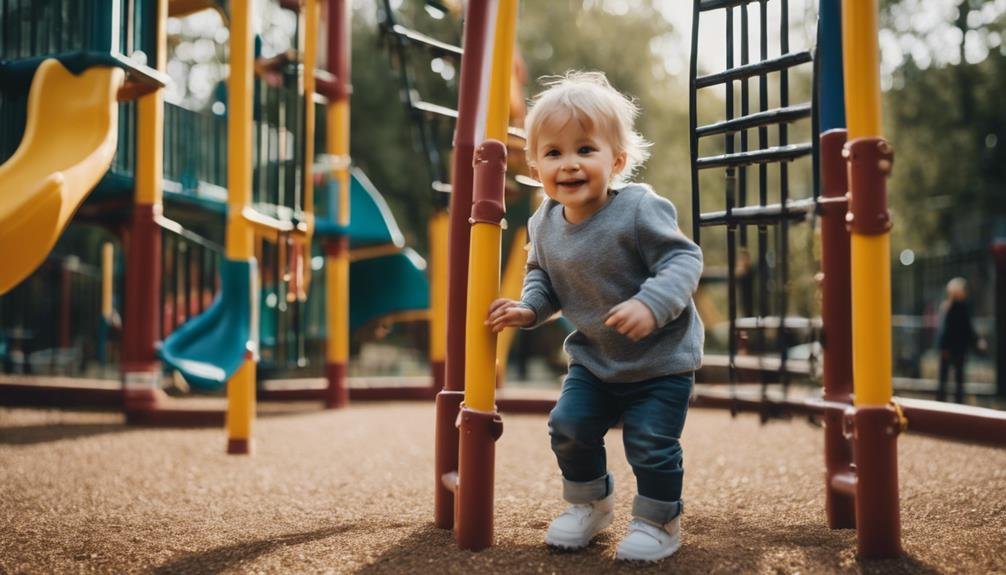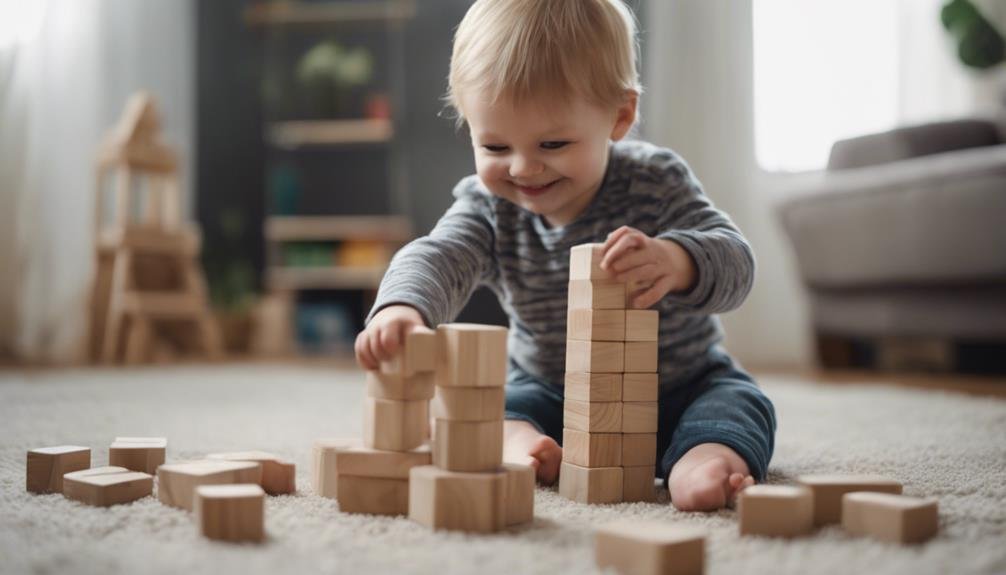"Cherishing Little Steps - A Haven for Baby and Family Journeys"
Building Self-Esteem in Toddlers: Positive Parenting Tips
Did you know that studies have shown that toddlers with higher self-esteem tend to be more resilient and better equipped to handle challenges later in life? Understanding how to nurture your toddler's self-esteem is crucial for their overall well-being and development. By implementing positive parenting techniques focused on building confidence and independence, you can set a solid foundation for your child's future success and happiness. So, how can you effectively boost your toddler's self-esteem and lay the groundwork for their future growth and resilience?
Key Takeaways
- Foster independence through supportive guidance and encouragement.
- Use praise and positive reinforcement to boost self-esteem.
- Set realistic expectations and celebrate efforts over outcomes.
- Teach problem-solving skills to enhance resilience and confidence.
- Create a nurturing environment with safety, support, and celebration.
Encouraging Independence and Exploration

To help your toddler develop a strong sense of self-esteem, encourage their independence and exploration in a supportive and nurturing environment. Allowing your child to take small risks, make choices, and try new things fosters their confidence and autonomy. Research shows that toddlers who are given opportunities to explore and assert their independence develop a positive self-image and a sense of competency. When you provide a safe space for your child to navigate challenges and learn from their experiences, you're helping them build resilience and self-assurance.
Encouraging independence doesn't mean leaving your child to figure everything out on their own. It means offering guidance and support while letting them take the lead in their activities. Simple tasks like letting them choose their clothes, pick a snack, or decide on a toy to play with can empower them and show them that their opinions and choices matter. By nurturing their independence in a loving and encouraging manner, you're laying a strong foundation for their self-esteem to flourish.
Providing Praise and Encouragement
Fostering a nurturing environment where praise and encouragement are consistently provided can significantly boost your toddler's developing self-esteem. When you praise your toddler's efforts and accomplishments, it helps them feel proud of themselves and builds their confidence. Simple phrases like 'You did a great job!' or 'I'm so proud of you for trying so hard' can go a long way in reinforcing positive behavior.
Encouragement is also essential in helping toddlers navigate challenges and setbacks. By offering words of support like 'You can do it, just keep trying' or 'I believe in you,' you're teaching them resilience and the importance of perseverance.
Research shows that children who receive genuine praise and encouragement from their caregivers are more likely to have higher self-esteem and a positive self-image. Remember to focus on their efforts rather than just the end result and celebrate their progress along the way. By providing consistent praise and encouragement, you're nurturing your toddler's sense of self-worth and helping them develop a healthy level of confidence.
Setting Realistic Expectations

Setting realistic expectations for your toddler's abilities and developmental stage is crucial for fostering a healthy sense of self-esteem. It's important to remember that toddlers are still learning and growing, and they may not always meet adult standards or timelines. Here are some tips to help you set realistic expectations for your little one:
- Understand Developmental Milestones: Familiarize yourself with typical developmental milestones for toddlers. This will help you have a better idea of what to expect from your child at different stages.
- Encourage Effort Over Perfection: Instead of focusing on perfect outcomes, praise your toddler for their effort and progress. This can help them build resilience and a positive attitude towards challenges.
- Be Patient and Flexible: Every child is unique and will progress at their own pace. Avoid comparing your toddler to others and allow them the time and space to learn and grow at their own speed.
Practicing Positive Reinforcement
Practicing positive reinforcement involves consistently acknowledging and praising your toddler's efforts and achievements to boost their self-esteem and motivation. When your toddler tries something new or completes a task, offering specific praise like 'You did a great job putting away your toys' helps reinforce positive behavior. This positive feedback encourages them to continue making an effort and builds their confidence.
It's essential to be genuine in your praise and focus on their actions rather than just the outcome. Research shows that children who receive regular positive reinforcement are more likely to develop a healthy sense of self-worth and resilience. By emphasizing their progress and efforts, you help them understand that it's okay to make mistakes and that improvement is more important than perfection.
Remember to celebrate even small victories, as these moments are significant for your toddler's self-esteem development. Your encouragement and recognition play a crucial role in shaping their self-perception and motivation to keep trying new things.
Teaching Problem-Solving Skills

To help your toddler develop essential life skills, consider guiding them in acquiring problem-solving abilities through everyday situations and playful interactions. Problem-solving skills are crucial for your child's development and can be nurtured from a young age.
Here are some tips to help you teach your toddler how to solve problems effectively:
- Encourage trial and error: Allow your toddler to try different approaches to a problem and learn from their mistakes. This will help them develop perseverance and resilience.
- Provide opportunities for decision-making: Offer simple choices and encourage your toddler to make decisions. This will empower them and boost their confidence in their problem-solving abilities.
- Engage in pretend play: Role-playing different scenarios with your toddler can help them practice thinking creatively and finding solutions to imaginary problems. This playful interaction can enhance their problem-solving skills in a fun and engaging way.
Promoting Healthy Communication
Promoting healthy communication with your toddler involves creating a supportive environment where open dialogue and active listening are encouraged. This foundation is crucial for building a strong parent-child relationship and nurturing your toddler's self-esteem. Here are some practical tips to enhance communication with your little one:
| Tip | Description | Benefits |
|---|---|---|
| Active Listening | Give your full attention, show empathy, and repeat back what your toddler says. | Fosters trust and understanding. |
| Use Simple Language | Speak in short, clear sentences that your toddler can easily comprehend. | Enhances comprehension and encourages talking. |
| Encourage Expression | Validate your toddler's feelings and encourage them to express themselves. | Promotes emotional intelligence and self-awareness. |
| Set a Good Example | Model positive communication by using respectful language and tone. | Teaches your toddler how to communicate effectively. |
Embracing Mistakes as Learning Opportunities

Embracing mistakes as valuable learning opportunities is essential for your toddler's growth and development. It's normal for toddlers to make mistakes as they explore the world around them. Here's why embracing mistakes can be beneficial for your little one:
- Promotes resilience: Encouraging your toddler to see mistakes as part of the learning process helps them develop resilience and the ability to bounce back from setbacks.
- Fosters problem-solving skills: By embracing mistakes, your toddler learns to analyze what went wrong and how to make things right, enhancing their problem-solving skills.
- Builds self-confidence: When you teach your toddler that mistakes are opportunities to learn and grow, you boost their self-esteem and confidence in their abilities.
Creating a Safe and Nurturing Environment
Creating a safe and nurturing environment for your toddler is crucial for their overall well-being and development. As a parent, it's essential to provide a space where your child feels secure, loved, and supported. Here are some key elements to consider in creating this environment:
| Element | Description | Importance |
|---|---|---|
| Physical Safety | Ensuring childproofing, removing hazards, and supervision | Protects from physical harm |
| Emotional Support | Showing affection, active listening, and validating feelings | Builds emotional resilience |
| Consistent Routine | Establishing predictable daily schedules and boundaries | Fosters stability and security |
Celebrating Achievements and Efforts

To nurture your toddler's self-esteem, acknowledging and celebrating their achievements and efforts is key in fostering their sense of accomplishment and confidence. It's essential to provide positive reinforcement and recognition for the milestones they reach and the hard work they put in.
Here's how you can effectively celebrate your toddler's achievements:
- Praise and Encouragement: Offer sincere praise for their accomplishments, no matter how small they may seem. Encouragement can go a long way in boosting their self-esteem and motivating them to continue trying their best.
- Create a Celebration Ritual: Establishing a special ritual to celebrate achievements, such as a high-five, a dance party, or a small reward, can make the moment even more memorable and reinforce positive behavior.
- Display Their Accomplishments: Showcase your toddler's achievements by displaying their artwork, certificates, or photos of special moments. Seeing their accomplishments on display can remind them of their capabilities and boost their self-worth.
Being a Positive Role Model
Demonstrate positive behavior and attitudes for your toddler to emulate by being a role model who exhibits self-confidence and kindness in your actions and words. Toddlers learn by observing the behavior of those around them, especially their parents or caregivers. When you display self-assurance and treat others with respect, your child is more likely to mirror these positive qualities.
Research suggests that children model their behavior after significant adults in their lives. By being a positive role model, you not only foster your toddler's self-esteem but also promote healthy social and emotional development. Remember to show empathy, patience, and good communication skills in your interactions with others, as your child will pick up on these cues.
Additionally, practicing self-care and self-compassion in front of your toddler teaches them the importance of looking after themselves both physically and emotionally. By prioritizing your well-being and demonstrating healthy coping mechanisms, you set a powerful example for your child to follow. Your actions speak volumes, so strive to be the positive role model your toddler needs to thrive.
Frequently Asked Questions
How Can I Help My Toddler Cope With Social Anxiety?
You can help your toddler cope with social anxiety by creating a safe environment, encouraging small social interactions, and modeling positive social behaviors. Providing reassurance, practicing deep breathing, and seeking professional help if needed can also support your child.
What Are Some Ways to Handle Toddler Tantrums Effectively?
When handling toddler tantrums, try "Time-Out Technique." Stay calm, set limits, and give them space to calm down. Offer comfort afterward. Consistency is key. Remember, tantrums are normal for toddlers learning to express emotions.
Is It Normal for Toddlers to Have Fears and Insecurities?
Yes, it's normal for toddlers to have fears and insecurities. They are developing emotionally and cognitively, encountering new experiences. Your understanding and reassurance can help them navigate these feelings, fostering their self-esteem and resilience.
How Do I Balance Discipline With Building Self-Esteem?
Balancing discipline with nurturing self-esteem involves setting clear boundaries with kindness. Encourage positive behavior through praise and constructive feedback. Show patience, understanding, and consistent love to help your child feel secure and confident as they learn and grow.
What Role Does Playtime Have in Developing Self-Esteem?
In developing self-esteem, playtime serves as a vital tool. Through play, toddlers explore, create, and learn about themselves. It fosters confidence, social skills, and problem-solving abilities. Like the saying goes, "Play is the work of childhood."
Conclusion
As you guide your toddler on their journey of self-discovery, remember to be their safe harbor in the stormy seas of life. Like a sturdy lighthouse, shine your light of love and encouragement, helping them navigate through challenges and setbacks.
Embrace their uniqueness, celebrate their victories, and show them the power of resilience. With your unwavering support, you're nurturing a strong foundation of self-esteem that will guide them towards a bright and confident future.


